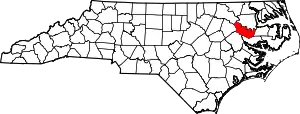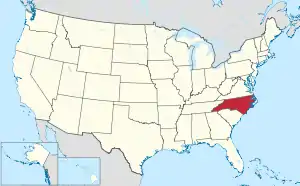Martin County, North Carolina
Martin County is a county located in the U.S. state of North Carolina. As of the 2020 census, the population was 22,031.[1] Its county seat is Williamston.[2]
Martin County | |
|---|---|
 Old Martin County Courthouse in Williamston | |
 Seal  Logo | |
 Location within the U.S. state of North Carolina | |
 North Carolina's location within the U.S. | |
| Coordinates: 35°50′N 77°06′W | |
| Country | |
| State | |
| Founded | March 14, 1774 |
| Named for | Josiah Martin |
| Seat | Williamston |
| Largest community | Williamston |
| Area | |
| • Total | 456.70 sq mi (1,182.8 km2) |
| • Land | 456.41 sq mi (1,182.1 km2) |
| • Water | 0.29 sq mi (0.8 km2) 0.06% |
| Population (2020) | |
| • Total | 22,031 |
| • Estimate (2022) | 21,508 |
| • Density | 48.27/sq mi (18.64/km2) |
| Time zone | UTC−5 (Eastern) |
| • Summer (DST) | UTC−4 (EDT) |
| Congressional district | 1st |
| Website | www |
History
The county was formed in 1774 from the southeastern part of Halifax County and the western part of Tyrrell County. It was named for Josiah Martin, the last royal governor of North Carolina (1771–75).[3] Whereas Dobbs County and Tryon County, named for Martin's predecessors Arthur Dobbs and William Tryon, were abolished after American independence, Martin County was neither abolished nor renamed, a fact which has been attributed to the popularity of Alexander Martin, twice governor of the state (1782–84, 1789–92).
The Martin County Courthouse was listed on the National Register of Historic Places in 1979.[4]
Geography
According to the U.S. Census Bureau, the county has a total area of 456.70 square miles (1,182.8 km2), of which 456.41 square miles (1,182.1 km2) is land and 0.29 square miles (0.75 km2) (0.06%) is water.[5]
State and local protected areas/sites
- Fort Branch Confederate Earthen Fort Civil War Site
- Foxtale Hunting Preserve
- Lower Roanoke River Wetlands Game Land (part)[6]
- Jamesville Wildlife Preserve
Major water bodies
- Conoho Creek
- Etheridge Creek
- Gardiners Creek
- Hardison Mill Creek
- Long Creek
- Roanoke River
- Smithwick Creek
- Tranters Creek
- Welch Creek
Adjacent counties
- Bertie County – northeast
- Washington County – east
- Beaufort County – southeast
- Pitt County – southwest
- Edgecombe County – west
- Halifax County – northwest
Major highways
Major infrastructure
Demographics
| Census | Pop. | Note | %± |
|---|---|---|---|
| 1790 | 6,010 | — | |
| 1800 | 5,629 | −6.3% | |
| 1810 | 5,987 | 6.4% | |
| 1820 | 6,320 | 5.6% | |
| 1830 | 8,539 | 35.1% | |
| 1840 | 7,637 | −10.6% | |
| 1850 | 8,307 | 8.8% | |
| 1860 | 10,195 | 22.7% | |
| 1870 | 9,647 | −5.4% | |
| 1880 | 13,140 | 36.2% | |
| 1890 | 15,221 | 15.8% | |
| 1900 | 15,383 | 1.1% | |
| 1910 | 17,797 | 15.7% | |
| 1920 | 20,828 | 17.0% | |
| 1930 | 23,400 | 12.3% | |
| 1940 | 26,111 | 11.6% | |
| 1950 | 27,938 | 7.0% | |
| 1960 | 27,139 | −2.9% | |
| 1970 | 24,730 | −8.9% | |
| 1980 | 25,948 | 4.9% | |
| 1990 | 25,078 | −3.4% | |
| 2000 | 25,593 | 2.1% | |
| 2010 | 24,505 | −4.3% | |
| 2020 | 22,031 | −10.1% | |
| 2022 (est.) | 21,508 | [1] | −2.4% |
| U.S. Decennial Census[7] 1790–1960[8] 1900–1990[9] 1990–2000[10] 2010[11] 2020[1] | |||
2020 census
| Race | Number | Percentage |
|---|---|---|
| White (non-Hispanic) | 11,528 | 52.33% |
| Black or African American (non-Hispanic) | 8,868 | 40.25% |
| Native American | 69 | 0.31% |
| Asian | 98 | 0.44% |
| Pacific Islander | 1 | 0.0% |
| Other/Mixed | 572 | 2.6% |
| Hispanic or Latino | 895 | 4.06% |
As of the 2020 census, there were 22,031 people, 9,378 households, and 6,195 families residing in the county.
2000 census
At the 2000 census,[13] there were 25,593 people, 10,020 households, and 7,194 families residing in the county. The population density was 56 people per square mile (22 people/km2). There were 10,930 housing units at an average density of 24 units per square mile (9.3 units/km2). The racial makeup of the county was 52.54% White, 45.37% Black or African American, 0.29% Native American, 0.24% Asian, 0.03% Pacific Islander, 0.90% from other races, and 0.63% from two or more races. 2.06% of the population were Hispanic or Latino of any race.
There were 10,020 households, out of which 31.60% had children under the age of 18 living with them, 50.30% were married couples living together, 17.60% had a female householder with no husband present, and 28.20% were non-families. 25.70% of all households were made up of individuals, and 11.90% had someone living alone who was 65 years of age or older. The average household size was 2.53 and the average family size was 3.02.
In the county, the population was spread out, with 25.50% under the age of 18, 7.50% from 18 to 24, 26.80% from 25 to 44, 25.00% from 45 to 64, and 15.20% who were 65 years of age or older. The median age was 39 years. For every 100 females there were 86.50 males. For every 100 females age 18 and over, there were 81.80 males.
The median income for a household in the county was $28,793, and the median income for a family was $35,428. Males had a median income of $29,818 versus $19,167 for females. The per capita income for the county was $15,102. About 16.30% of families and 20.20% of the population were below the poverty line, including 27.50% of those under age 18 and 25.70% of those age 65 or over.
Law and government
Martin County is a member of the Mid-East Commission regional council of governments.
Politics
Martin County is a historically Democratic county; in 2004, it voted Republican for only the fourth time, the first three having been in the Republican landslides of 1872, 1972, and 1984. Barack Obama won the county back for the Democratic Party in both 2008 and 2012, but in 2016, it narrowly backed Donald Trump. In 2020, it narrowly supported Trump again, voting for a losing Republican nominee for the first time ever.[14] On the same day, Martin County voted to reelect Democratic Governor Roy Cooper in the North Carolina gubernatorial election.
| Year | Republican | Democratic | Third party | |||
|---|---|---|---|---|---|---|
| No. | % | No. | % | No. | % | |
| 2020 | 6,532 | 52.09% | 5,911 | 47.14% | 97 | 0.77% |
| 2016 | 5,897 | 49.29% | 5,846 | 48.86% | 221 | 1.85% |
| 2012 | 5,995 | 47.38% | 6,583 | 52.03% | 74 | 0.58% |
| 2008 | 5,957 | 47.50% | 6,539 | 52.14% | 45 | 0.36% |
| 2004 | 5,334 | 51.03% | 5,102 | 48.81% | 16 | 0.15% |
| 2000 | 4,420 | 47.19% | 4,929 | 52.63% | 17 | 0.18% |
| 1996 | 3,590 | 41.98% | 4,500 | 52.62% | 462 | 5.40% |
| 1992 | 2,958 | 36.90% | 4,069 | 50.76% | 989 | 12.34% |
| 1988 | 3,149 | 46.61% | 3,598 | 53.26% | 9 | 0.13% |
| 1984 | 4,266 | 52.32% | 3,870 | 47.47% | 17 | 0.21% |
| 1980 | 2,564 | 34.59% | 4,750 | 64.09% | 98 | 1.32% |
| 1976 | 1,931 | 29.81% | 4,518 | 69.75% | 28 | 0.43% |
| 1972 | 4,188 | 68.76% | 1,840 | 30.21% | 63 | 1.03% |
| 1968 | 1,221 | 14.97% | 3,118 | 38.22% | 3,818 | 46.81% |
| 1964 | 1,511 | 23.86% | 4,821 | 76.14% | 0 | 0.00% |
| 1960 | 737 | 11.23% | 5,826 | 88.77% | 0 | 0.00% |
| 1956 | 449 | 7.27% | 5,730 | 92.73% | 0 | 0.00% |
| 1952 | 415 | 7.02% | 5,493 | 92.98% | 0 | 0.00% |
| 1948 | 163 | 3.36% | 4,636 | 95.53% | 54 | 1.11% |
| 1944 | 133 | 2.93% | 4,408 | 97.07% | 0 | 0.00% |
| 1940 | 106 | 2.24% | 4,628 | 97.76% | 0 | 0.00% |
| 1936 | 111 | 2.42% | 4,477 | 97.58% | 0 | 0.00% |
| 1932 | 94 | 2.42% | 3,781 | 97.37% | 8 | 0.21% |
| 1928 | 411 | 12.73% | 2,818 | 87.27% | 0 | 0.00% |
| 1924 | 216 | 9.71% | 1,999 | 89.88% | 9 | 0.40% |
| 1920 | 530 | 17.15% | 2,561 | 82.85% | 0 | 0.00% |
| 1916 | 281 | 16.03% | 1,472 | 83.97% | 0 | 0.00% |
| 1912 | 229 | 15.13% | 1,251 | 82.63% | 34 | 2.25% |
Education
The primary and secondary public school functions are performed by Martin County Schools, a district covering the entire county. Martin Community College is located in Williamston.
Communities

Towns
- Bear Grass
- Everetts
- Hamilton
- Hassell
- Jamesville
- Oak City
- Parmele
- Robersonville
- Williamston (county seat and largest community)
Townships
- Bear Grass
- Cross Roads
- Goose Nest
- Griffins
- Hamilton
- Jamesville
- Poplar Point
- Robersonville
- Williams
- Williamston
Notable people
- Annie Moore Cherry, professor, author, and playwright
- Wilber Hardee, founder of Hardee's
- William Drew Robeson I, minister of Witherspoon Street Presbyterian Church
See also
References
- "U.S. Census Bureau QuickFacts: Martin County, North Carolina". United States Census Bureau. Retrieved May 31, 2022.
- "Find a County". National Association of Counties. Retrieved June 7, 2011.
- Gannett, Henry (1905). The Origin of Certain Place Names in the United States. U.S. Government Printing Office. p. 201.
- "National Register Information System". National Register of Historic Places. National Park Service. July 9, 2010.
- "2020 County Gazetteer Files – North Carolina". United States Census Bureau. August 23, 2022. Retrieved September 9, 2023.
- "NCWRC Game Lands". www.ncpaws.org. Retrieved March 30, 2023.
- "U.S. Decennial Census". United States Census Bureau. Retrieved January 18, 2015.
- "Historical Census Browser". University of Virginia Library. Retrieved January 18, 2015.
- Forstall, Richard L., ed. (March 27, 1995). "Population of Counties by Decennial Census: 1900 to 1990". United States Census Bureau. Retrieved January 18, 2015.
- "Census 2000 PHC-T-4. Ranking Tables for Counties: 1990 and 2000" (PDF). United States Census Bureau. April 2, 2001. Archived (PDF) from the original on March 27, 2010. Retrieved January 18, 2015.
- "State & County QuickFacts". United States Census Bureau. Archived from the original on July 21, 2011. Retrieved October 27, 2013.
- "Explore Census Data". data.census.gov. Retrieved December 24, 2021.
- "U.S. Census website". United States Census Bureau. Retrieved January 31, 2008.
- "County winners, 1836-2016". Google Docs. Retrieved April 30, 2021.
- Leip, David. "Dave Leip's Atlas of U.S. Presidential Elections". uselectionatlas.org. Retrieved March 16, 2018.
External links
 Geographic data related to Martin County, North Carolina at OpenStreetMap
Geographic data related to Martin County, North Carolina at OpenStreetMap- Official website
- NCGenWeb Martin County, genealogy resources for the county
